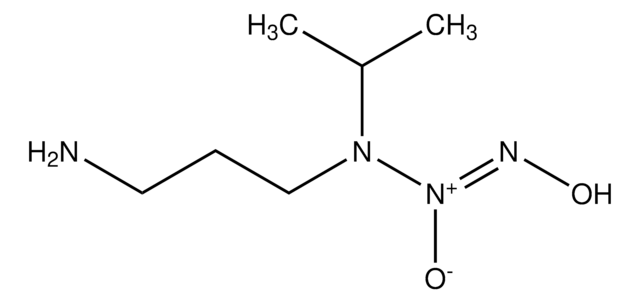E3145
3-Ethyl-3-(ethylaminoethyl)-1-hydroxy-2-oxo-1-triazene
≥90%
Synonym(s):
NOC-12
About This Item
Recommended Products
Quality Level
Assay
≥90%
storage temp.
−20°C
SMILES string
CCNCCN(CC)\[N+]([O-])=N\O
InChI
1S/C6H16N4O2/c1-3-7-5-6-9(4-2)10(12)8-11/h7,11H,3-6H2,1-2H3/b10-8-
InChI key
DPKCLDSTXVCYSN-NTMALXAHSA-N
General description
Application
Biochem/physiol Actions
Signal Word
Danger
Hazard Statements
Precautionary Statements
Hazard Classifications
Self-react. C
Storage Class Code
5.2 - Organic peroxides and self-reacting hazardous materials
WGK
WGK 3
Flash Point(F)
Not applicable
Flash Point(C)
Not applicable
Personal Protective Equipment
Certificates of Analysis (COA)
Search for Certificates of Analysis (COA) by entering the products Lot/Batch Number. Lot and Batch Numbers can be found on a product’s label following the words ‘Lot’ or ‘Batch’.
Already Own This Product?
Find documentation for the products that you have recently purchased in the Document Library.
Articles
Nitric oxide (NO) as a signal transporter in neurons, endothelial cells and in the immune system.
Our team of scientists has experience in all areas of research including Life Science, Material Science, Chemical Synthesis, Chromatography, Analytical and many others.
Contact Technical Service









